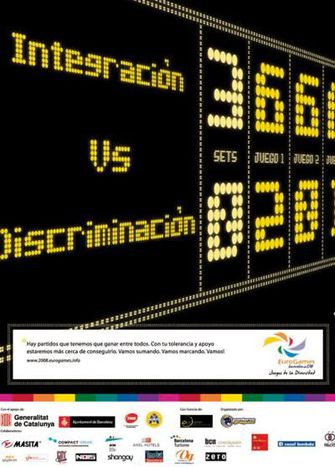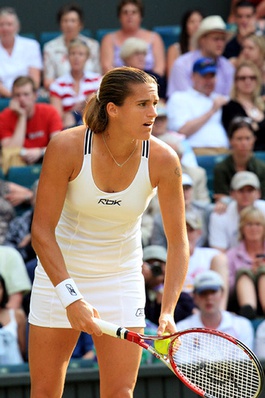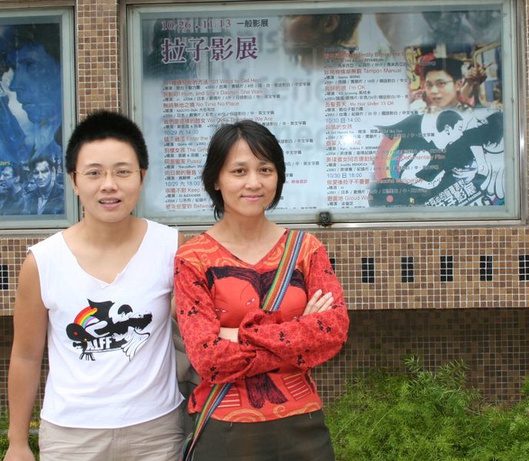
Homophobia in the Olympic games: ‘deaf discrimination’
Published on
Translation by:
Nabeelah ShabbirThe co-founder of ‘Eurogames 2008’ in Barcelona and a member of Hong Kong gay forum 'Horizons' provide a European-Chinese perspective on the gay community in sport, ahead of the Olympics on 8 August
5, 300 European sportsmen from the GLBT (gay, lesbian, bisexual and transsexual) community came together on 24 – 27 July in Barcelona to perform in 28 sports categories at the twelfth edition of 'Eurogames'. It shows that Europe can celebrate such a gathering. But as the world’s biggest sporting event looms in China on 8 August, the focus is on homosexual rights which continue to be violated there.
‘Eurogames tries to be a forum,’ begins Pepe García Vázquez, co-president of the European gay and lesbian sports federation. He co-organised the Eurogames alongside local associations, and maintains that above all, ‘we want to improve the visibility and co-operation between the members of a community sharing the same interests.’ With more than 1, 600 members from 110 associations in twenty-one European member states, the federation aims to fight discrimination whilst encouraging the integration and the emancipation of gays and lesbians in sport. ‘I am often asked if we are just aiming to create a ghetto exclusively for homosexuals with the Eurogames. But ghettos are a product of a society; they only exist because people reject another type of person,’ says García. Barcelona's Eurogames aren’t just for homosexual people; they are open to everybody: ‘We are on a permanent lookout for excellence in sport,’ adds García.
A dozen homosexuals at Athens Olympics, 2004
 García explains that the very need to organise the Eurogames is a symptom of the homophobia which is so omnipresent in sport. Certain problems in society are accentuated in the sports realm. ‘The first insult you hear in football will almost certainly be a homophobic one.’ As for the Olympic games and fellow high-level sports competitions, García reminds us that the number of active sportsmen out of the closet is extremely low. ‘Some only reveal their sexuality when they are retired,' he says, hinting at stars like British-born NBA basketballer John Amaechi. 'It’s deaf discrimination,’ he says, motivated by the fear of rejection from colleagues or potential advertising deals - Czech tennis player Martina Navratilova is said to have lost 12 million dollars in sponsorship deals.
García explains that the very need to organise the Eurogames is a symptom of the homophobia which is so omnipresent in sport. Certain problems in society are accentuated in the sports realm. ‘The first insult you hear in football will almost certainly be a homophobic one.’ As for the Olympic games and fellow high-level sports competitions, García reminds us that the number of active sportsmen out of the closet is extremely low. ‘Some only reveal their sexuality when they are retired,' he says, hinting at stars like British-born NBA basketballer John Amaechi. 'It’s deaf discrimination,’ he says, motivated by the fear of rejection from colleagues or potential advertising deals - Czech tennis player Martina Navratilova is said to have lost 12 million dollars in sponsorship deals.
Take the last edition of the Olympic games which took place in Athens in 2004, where ‘out of 11, 000 sportsmen, only a couple of men and nine or ten women were openly gay.’ García suggests there are more ‘gay games’ in individual fields, like the equestrian competition, or people like Australian athlete Lisa-Marie Vizaniari, who was in the discus event of the 2000 Olympic Games in Sydney.
 Although a report from ChinaBBS (an organism dedicated to social research, financed by the Volkswagen foundation), estimates that there are almost thirty million gay and lesbians in the country, in China there are no sports where competitors are openly gay. Reggie Ho, honorary delegate of the Horizons association based in Hong Kong, agrees. ‘Legally in the mainland, homosexuality is not even recognised as an issue (it was decriminalised in 1997, after having been severely repressed during the cultural revolution). But sexual minorities are subject to persecution under other laws that do not overtly go against them, such as those regarding public order and security.’ Ho explains that in the special administrative ares of Hong Kong, Macao and Taiwan, there have been cases in which judges have made declarations of their own accord on homosexuality.’In almost all of these cases, the declarations were adverse to sexual minorities.’
Although a report from ChinaBBS (an organism dedicated to social research, financed by the Volkswagen foundation), estimates that there are almost thirty million gay and lesbians in the country, in China there are no sports where competitors are openly gay. Reggie Ho, honorary delegate of the Horizons association based in Hong Kong, agrees. ‘Legally in the mainland, homosexuality is not even recognised as an issue (it was decriminalised in 1997, after having been severely repressed during the cultural revolution). But sexual minorities are subject to persecution under other laws that do not overtly go against them, such as those regarding public order and security.’ Ho explains that in the special administrative ares of Hong Kong, Macao and Taiwan, there have been cases in which judges have made declarations of their own accord on homosexuality.’In almost all of these cases, the declarations were adverse to sexual minorities.’
Gay is not a priority
 Will the August Beijing Olympics change anything? Reggie Ho doesn’t seem convinced. ‘Both Beijing and Hong Kong are preoccupied with too many other social issues; sexual orientation is not even near their radar. Beijing is not overly concerned with sexual orientation issues, but they still want to suppress sexual minorities; gay bars are regularly raided. They fear the unknown and think that publicity about sexual minorities in China makes them look bad.’
Will the August Beijing Olympics change anything? Reggie Ho doesn’t seem convinced. ‘Both Beijing and Hong Kong are preoccupied with too many other social issues; sexual orientation is not even near their radar. Beijing is not overly concerned with sexual orientation issues, but they still want to suppress sexual minorities; gay bars are regularly raided. They fear the unknown and think that publicity about sexual minorities in China makes them look bad.’
Apart from the fact that in recent years prominent gay figures have ‘organised services for sexual minorities and obtain government funding under the consideration of AIDS prevention,’ according to Ho, ‘gay’ still equals ‘AIDS’ in the Chinese government. In the majority, gay people remain hidden. ‘Other ‘activists’ have done work online,’ finishes Ho. ‘In fact most sexual minorities in mainland China rely on the internet to maintain a space where they can be themselves.’
Translated from Homosexuales en los JJ OO: “una discriminación sorda”



